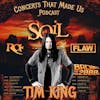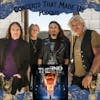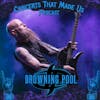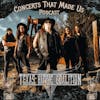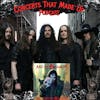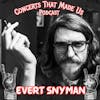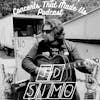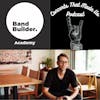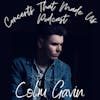🎵 Dive into the Depths of Bellwether's New EP "Gods" 🎵
In this captivating podcast episode, Brian warmly welcomes Isaac and Nate, the incredibly talented members of the band Bellwether back for their second appearance on the show. Together, they embark on an enlightening conversation centered around their latest EP, aptly titled "Gods," delving into the profound emotional themes that permeate their music. Gods is released on 22nd September.
Isaac and Nate graciously open up about their exhilarating journey during the recording process, sharing the various challenges they encountered along the way. With unwavering determination and a passion for their craft, they recount the personal growth they experienced, both as individuals and as a collective unit. It becomes evident that their dedication to their artistry knows no bounds.
During the discussion, Isaac and Nate shed light on their deliberate decision to release "Gods" as a complete EP, rather than opting for the more common approach of releasing singles. They express their desire to create a cohesive and immersive experience for their listeners, allowing them to fully immerse themselves in the musical narrative they have crafted so meticulously.
Despite the geographical distance that separates them, Isaac and Nate proudly share their unwavering commitment to Bellwether. Living in different states has not hindered their creative process; instead, it has only fueled their determination to create music that resonates deeply with their audience.
As the conversation unfolds, Isaac and Nate's passion for live performances becomes palpable. They speak fondly of the electrifying energy that fills the air during their shows, emphasizing the profound connection they feel with their fans. It is evident that the stage is where they truly come alive, pouring their hearts and souls into every performance.
Excitingly, Isaac and Nate reveal their future plans, teasing the release of a second EP titled "Idols." They share their vision of seamlessly combining "Idols" with "Gods," creating a cohesive and thought-provoking body of work that will undoubtedly captivate their audience.
With their unwavering dedication, emotional depth, and boundless creativity, Isaac and Nate from Bellwether are undoubtedly a force to be reckoned with in the music industry. This podcast episode offers a rare glimpse into their artistic journey, leaving listeners eagerly anticipating what the future holds for this remarkable band.
Find Bellwether here:
https://linktr.ee/bellwethermusicatl
https://m.facebook.com/bellwethermusicATL/
https://www.bellwethermusicatl.com/
https://www.instagram.com/bellwethermusicatl/
Find CTMU here:
https://linktr.ee/Concertsthatmadeus
Newsletter: https://concertsthatmadeus.aweb.page/p/f065707b-2e34-4268-8e73-94f12bd2e938
If you would like to support the show you can do so by rating/reviewing us on Itunes and Spotify or by signing up at https://www.patreon.com/Concertsthatmadeus
Save 10% on Band Builder Academy membership by following this link https://bandbuilderacademy.com/Brian_Concerts/join and using promo code "concerts" at signup.
Become a member at https://plus.acast.com/s/concerts-that-made-us.
Hosted on Acast. See acast.com/privacy for more information.
Brian (00:00:00) - Guys. I can't say how happy I am to say, Welcome back to the show. How are you?
Nate (00:00:06) - We're great. Great.
Isaac (00:00:08) - It's good to be back. I appreciate you having us.
Brian (00:00:11) - It's fantastic. No, it's a I was thinking earlier on, I was I was like, it's always a good day when you're talking about new bellwether music.
Isaac (00:00:19) - Yeah, absolutely. It's it's been a long time coming, but we're. We're happy the day is here.
Brian (00:00:24) - That's great. So it's called Gods. It's out on September 22nd. What can you tell us about it?
Isaac (00:00:34) - All. So this this EP we wrote, actually one of the tracks was the first song that we wrote together as Bellwether. It was it's our our second track Night Comes. It came together really quickly and it was when a lot of crappy stuff was going on in our lives. And I feel like this Holy P kind of has like a little bit of a darker feel to it than what we've released so far. But I would say it's it's really I know on last episode we talked about starting Bellwether because it was kind of like therapy for us.
Isaac (00:01:19) - And I feel like these songs really portray that we I kind of had a lot to to get off my chest. And, you know, not all of them are things that are going on currently in my life, but a lot of them were about past things, past hurts and struggles. So that's kind of you'll probably hear it's a little bit on the darker side than what we've released so far. But I feel like it really says who we are a little more than than what we have out so far. Nate I don't know if you have anything to add on your end because I know, I know we were both going through a lot when we wrote this.
Nate (00:01:57) - Yeah, it's it's definitely yeah, I would definitely say it's more on the real and darker side. Um, but you know, with Isaac's lyrics and stuff, there's definitely a lot of hope there as well of just kind of, you know, coming through on the other side, you know, learning some things and, you know, and having a little bit better perspective, you know, having gone through, you know, different struggles and and all of that.
Nate (00:02:24) - Um. But yeah, it's the whole record. The way I is going to write music, it kind of like. I don't really feel like there's any songs on this that we really kind of struggled to write, and I feel like most of them came pretty came pretty naturally. And so, you know, it's we've worked really hard on this and it's been kind of a long time. It's been a long process. Um, but we are we're really happy with how everything came out and just how even just the order of the songs and just how everything flows together as a whole record or as a whole EP. We're just, we're, we couldn't be happier. And I kind of I know we talked about it last time, but, you know. We've said multiple times where we where we talk about like even if nobody likes this, you know what I mean? Which I hope that's not the case. But like, even if this is just for us, like we are so proud of the of the music that we put together with the songs that we wrote.
Nate (00:03:32) - And just as just like a piece of work, we're just really, really proud of it.
Brian (00:03:39) - Just want to jump back to something. Something Isaac said was it was the first song that you made together as Bellwether and you were going through some tough times. You're obviously past the tough times now, but was there a fear of maybe, you know, dragging up them feelings and getting kind of bogged down and that sort of situation or sort of feeling?
Isaac (00:04:01) - Yeah. I mean, I. So my my wife will tell you this if you ever talk to her. I'm not good at it at expressing my emotions. I'm not good at talking about my feelings. But something happens like when I play music, specifically when I play music with Nate, I just can I just feel like I can be really honest and kind of get off my chest what I need to get off my chest. Um, and I'm always a little fearful of putting that out to the world in case people because I mean, a lot of this stuff I even sing about isn't specifically what I'm thinking in that moment or what I'm feeling, but it's just something I've needed to just get off my chest or something that I felt at a specific time in my life.
Isaac (00:04:50) - So it is hard because all people hear is the song. So putting that out there is always a little nerve wracking, but. But I felt like these songs needed to be done.
Brian (00:05:04) - I see. I see. And, you know, how did you guys approach the recording process?
Nate (00:05:11) - Yeah. So my the recording thing for me kind of became my project. I was out of work because, you know, during Covid. I mean, I'm, I'm a chef. That's what I do for money. I wish I did this for money, but, um, so, you know, for about seven months, I was out of I was out of work living in my my wife and I were living in my in-laws basement. We got displaced from Boston and we moved back. I think we covered it the last time. But as we moved back to to Atlanta and that's when Isaac and I kind of reconnected on music and everything. And so my project was basically building a recording studio in my house.
Nate (00:05:53) - And so as you can see behind me, this is where I recorded literally like all the drums for the record. So, you know, we moved and we have a new house and I've got a new little room here and everything. But the recording has been something where Isaac and I start with, you know, just like you would if you were all in the same room, all in the same place. You know, we start with scratch guitars and, you know, all that to where I have something to play with. But I recorded all of the drums here, and then I sent them to Isaac, and then Isaac built all the tracks from there. So Isaac recorded the bass, the guitar, vocals, background vocals, synth piano, all of that. And then we have a good friend in Boston named Rob Wu. He plays with a band called Mission to Sleep, and he produced our or he mixed and mastered our track, Mild Hearts. And then we decided to work with him again for this full length.
Nate (00:06:57) - And so he kind of on this project became more of a producer. Isaac and I work somewhat like producing it ourselves, but he also kind of provided that third party. Here's the idea. Here's where we're at. You know, give us an objective opinion on is this good? Is, you know, is it? And the funny thing about like, I wouldn't think anybody who's writing music would say that their music is boring, right? But when you're going through and you're recording something, you have to you have to ask those questions of, okay, so we have all of these parts. We have a, you know, a verse and a bridge and whatever it is, you have to objectively look at it and say, okay, so is this is this interesting? Is this keeping people's attention? Is, you know, do we need to add something here? Do we need to switch something? And honestly, sometimes it's like, okay, so we have a verse two and a verse three.
Nate (00:07:59) - Should we flip those and does that make more sense? So having that having that third party who has essentially nothing to do with writing the songs. Come in and say, okay, so here's what you guys are thinking, here's what I'm thinking. And then you're able to come up with a better idea and a better end product because you have that that perspective. That's not you because sometimes you're just too close. So that's kind of how we recorded it this time. So, you know, it started with me, went to Isaac, and then we then we sent it up to to Rob, and then we kind of just worked work through all of it. So, Isaac, what about you? What about on your end and your dark basement? Yeah.
Isaac (00:08:47) - I really I've got like a little corner in my basement where I've got my my focus right plugged into my Mac and just my little synth. And that's that's where I spent a ton of nights just, you know, recording for two hours here, two hours there after I put my daughter to sleep.
Isaac (00:09:06) - So it was this was definitely a labor of love. But but we're really we're really proud of of what we're putting out.
Brian (00:09:17) - You know, it's your first release. And I think just over a year, the last release you had was the the cover of the Nirvana song. I absolutely loved that, by the way. It's I think I said it here at the time. It was the first cover I've heard that was just as good, if not better than Nirvana, but means that musically, what has the time been like for you guys?
Isaac (00:09:42) - Man. Honestly, it's to be completely honest, it's been a little rough. I mean, Nate and I were ready to pull our hair out with this EP. To be completely honest, like, we're. It's crazy because writing the songs is the beginning of the process. It's not even, to be honest, it's not even the hard part. Like recording really, really tested us this time and get getting these songs done. But I think really, since the last time we talked, it's been a ton of recording and it's kind of listening back and.
Isaac (00:10:22) - And Nate's been really, really patient with me because I'll listen and I'll be like, Nate, I hate this song. Like, we can't release this. And he's like, Dude, just go to sleep, listen to it in the morning and you'll be fine. Like, we'll get through this. So. So there were a lot of there was a lot of that, but, um, but yeah, it's really been taken up a lot by recording and just trying to be patient with ourselves and put out the best, the best portions and the best song versions that we can.
Brian (00:10:56) - So now if you were obviously the voice of reason, then.
Nate (00:11:01) - Sometimes Yeah, yeah. It's I, I think this is probably Isaac, correct me if I'm wrong, this is probably. I don't know. So this is five songs. We put out five songs with Bellwether, and then our last band, we probably did, I don't know, 15 or 20 songs. So I mean, Isaac and I collectively have recorded together, you know, almost 30 songs.
Nate (00:11:28) - And it's like every time you go into the process, you learn something different about yourself, about whatever music you're playing. And I really enjoy the process, not I think there would be a lot of musicians that would tell you that. They don't I don't know. It's it's a very it's a very testing process, like demons. So we were talking to Rob, the guy that produced our record and he was talking to us about how he really liked our approach to how we were doing it. Because at least on my end, when it comes to playing the drums, I, I get the best full take I possibly can. Like I don't copy and paste, I don't I start it and I play it through and if I mess up. I started again. And so demons specifically for me. This was awesome. This was a day where I almost lost it. Isaac can attest to that. I'd finally gotten the take exactly correct. And I was I don't even remember what I was necessarily doing, but I had sent everything over to Isaac, and I think I probably was just my OCD was kicking in.
Nate (00:12:48) - I think I was like getting stuff off of my computer. And I thought that I had put my final drum logic track on my my external hard drive before I deleted it. But I hadn't. Oh, my God. I had done I had done probably just to be, you know. Probably two honest. I'd probably done 22 takes of this song and I had finally gotten it exactly how I wanted it and I deleted it and go back. What's that?
Isaac (00:13:26) - That and it's over five minutes long. It's our longest song.
(00:13:29) - Yeah.
Nate (00:13:30) - And the end is like the end is the most difficult part, recording wise of the whole of the whole thing. And so, like, I had to go back through and I think I did it in two at that point because I had just like I had muscle memory, like nobody's business at that point. But like, it's just it's one of those things where, like you when you're recording and you, you know, you've written these songs and you, you have all these things going and then you go back and you listen to them 20 times.
Nate (00:14:03) - Again, like I said before, you get you get too close. And that's like a lot of times, some of the best things that you can do in any creative project is like. Sleep on it and come back. Because if you've listened to it, you know, once, your ears are probably correct. 10th time. Your ears are not correct. Like you, you have this like diminishing returns when you're when you're listening to it and you're you're not you're not listening to it the same you same way you were the first time. So a lot of times it's it's about taking a break and not really trying to force it and just. Giving yourself a breather. You know, whether it's, you know, on days where I was recording and I was really in it. I would stop. I would go take my dog for a walk. I would go for a run. I would, you know, go to the store, you know, whatever it was, take a break and then come back.
Nate (00:15:03) - And it was always better at that point than it was if I was just sitting there like, take ten frustrated, throwing drumsticks and, you know, upset, you know. So it's just recording. Recording is challenging because you you think you think your take was good and then you listen back. You're like, nope, let's do it again, you know? Yeah. So it's it's definitely been it's definitely been a challenge. And doing it yourself is, is even more challenging because you're, you're your own last line of defense, you know, because you don't have somebody else, you know, behind the glass. Kind of like really, really keeping you accountable. It's it's all you or it's all your band mate who you send it to. And you're like. Yeah, that's. You should probably hit that one again, you know, so.
Brian (00:15:57) - Right, Right. And you know, when it comes to releasing it, you're taking a very unconventional route. Well, unconventional these days anyway. You're not releasing singles.
Brian (00:16:07) - You're just releasing it all as one.
Isaac (00:16:11) - Yeah, we have this conversation with each other, um, because we didn't know what we were going to do. We. We were like, should we do an EP? Should we do a full length? Should we just release these songs separately? Um, but I don't, I don't honestly remember. Nate You might. What what kind of was our final decision on, on doing an EP? But I do feel like the album is still alive. A lot of my favorite bands release full length albums that I listened to from start to finish, and they're more of an experience than just a single. Um, and I mean, I think another, another reason is I feel like it gives a little bit more legitimacy to a band. If you have a collection of songs that kind of work together. Um, and I feel like these songs needed to be together. I think that might have been one of the main things. They have a very similar theme to them, but.
Isaac (00:17:12) - Nate Yeah, I don't know if you remember exactly what made us fall on doing an EP, but that's kind of the approach I remember.
Nate (00:17:22) - Yeah, we. So we have. I think we have probably a total of probably 17 to 20 songs total. Um, and we have when we were coming up to this process and we had released a few things and you know, we were kind of figuring out what was next. Um, we kind of like Isaac said, we had some songs that kind of had similar themes. So these ones we decided to do Gods as an EP, and then we have another set of songs which at some point we were going to start recording. Um, we might need some, some rehab after this one. Um, and then so we have the second half that's going to be called Idles, and it's basically going to be two halves of the same thing. So essentially we will have a full length that will kind of work together as kind of like two, two pieces, which, you know, if maybe, you know, maybe we can start saving now and we might be able to afford vinyl, you know, in like ten years.
Nate (00:18:31) - But so with the with the concept of not releasing a single one, we felt like these songs worked together specifically as an EP. They all have the same theme. We even. We know we notice it because we did it. But I don't know if you've listened to it, but when when the EP ends, we take the chorus. Or No, I'm sorry. The bridge from night comes and we bring it back as a theme at the end of God's in that big, kind of like heavy ending to the EP. And so we wanted to we didn't want to steal that. You know, we, we did that intentionally. We brought that back because it was such a good theme for the, for the whole entire EP where Isaac says, Is it God or is it the devil? Like, like bringing that whole thing to fruition? And we didn't want to release a single, just to be honest. Like whenever anybody releases singles, I'm so sick and tired. Like if they, if they release like a whole record and it's ten songs and they release three singles, I don't want to listen to those songs.
Nate (00:19:45) - By the time that record comes out. And then so then I can't actually enjoy that whole record as a piece of work because I'm like, okay, so they released Track two as a single and I listen to it 100 times already, so I'm going to skip that one. And I just felt we felt like it just kind of stole that, that, that enjoyment of yeah, that newness of being able to like, I know this is like old school, but like putting in a C sitting on the couch in front of a good pair of speakers and just like sitting down and just experiencing it from track one to track five and being able to say, Man, that was really great. Like I really the transitions were great. This song worked perfectly going into this song, and we we spent a lot as like, how many times do we go to masses drinking beer, trying to figure out what song was going, going to go into what song and what order it was going to be like. It was very intentional and it was a very long process trying to figure it out and.
Nate (00:20:50) - You know, we wanted to. We want people to experience it that way because we we really put a lot of time and effort thinking about it.
Brian (00:20:58) - Oh, and you know, for the listener then when they pick up, well, not pick up this record, but when they turn it on. Is there any specific themes or messages you hope they get from it?
Isaac (00:21:12) - Nate touched on it a little bit. You know, the lyrics are a bit darker on this one, but there definitely is a theme of hope to it. You know, I wrote a lot of these songs about bad things in my life, but I'm here, I'm happy. You know, I'm getting to play music with my best friend and and I feel like you can. Feel the hope in them, even though they're dark songs. So I do hope people listen to them can relate to the dark themes, but I can understand that there's hope, you know, on the other side. And just to kind of keep keep pushing through those those really bad times.
Brian (00:22:02) - Nice, right? I like it. I like it. You know, something that intrigues me with records is I'm always thinking when you had the initial idea and then through the whole process, how does the final product match up to the the original vision?
Isaac (00:22:22) - I mean, I think it's very close. Um, Nate was talking about our buddy Rob that produced the record. He definitely. And we asked him to please be honest, and he called me out on some choruses or some parts here and there. Um, the chorus for Worlds deep inside us. The, the opening track was completely different when we came into what that, what we sent him. And he was like, you know, the chorus is fine, but it doesn't hit me. So I was like, Man, I gotta, I gotta rethink a song that we thought was done, which I mean, Nate and I pretty much, we always come in with an open mind and we want people to be honest and not just be like, Oh yeah, it's good and not really care.
Isaac (00:23:15) - But it still is really hard to get out of that mindset of, Okay, this is the chorus I need to completely forget everything I know and write in chorus. Um, so I think, I think for that one I, I just recorded the guitar and I listened to it in my car just over and over with just the guitar and tried to listen to it with new ears and forget the old chorus. But I think it elevated the song. Um, and most of the songs are pretty much exactly how we wrote. Not exactly, but they're very similar to how we wrote them. And Rob is just really good at elevating them.
Nate (00:24:00) - Yeah, because like I said before, it's like, you know, we when you write something, you know, you have that third party to where somebody can say, Hey, like, yeah, this is good, but I think it can be better. And and that's also what can be really hard about recording because any time. There's in my opinion, there's two specific difficult things about anything that you put out to the public and anything that you do creatively, because there's always there's always a personal a very, very personal element to it because you're being vulnerable.
Nate (00:24:41) - And so when you come into the recording process and you're recording with somebody else, like I remember it wasn't this project, but it was a project that Isaac and I did before, Like we came, came in with the song to pre-production and we were super excited about it and we played it and the guy was like, Absolutely not.
Brian (00:24:59) - Oh man.
Nate (00:25:01) - It's like, Yeah, it's like, absolutely not. I'm not. I'm not putting that on the record. We're like, That's. We've been playing the song for three years. We loved it. It was great. You know, we thought it was great. All these things is like in the current form. It's not going on the record. We literally Isaac, I don't know if you remember that we literally stayed in that studio until one, two, 3:00 in the morning and completely rewrote an entire song. And that next day, again, not this project, but that was one of the most difficult days for me as a musician in the in the studio the next day, because that three years of muscle memory playing the song one way and then overnight I had to completely relearn the entire song and then actually play it to a click track and actually do it really difficult.
Nate (00:25:44) - Back to my point. To be able to come in with something so personal as music and have somebody just go, sorry, like this isn't like to Isaac's point, like, sorry, the chorus just isn't hitting me. Can you go ahead and, like, completely reimagine it and completely sing in a completely different way and come at it from a different angle? It's really difficult to do something like that. And then the second part is like once once it's out there and then people start having their critiques about what it is that you just poured yourself into it. You know, music is a vulnerable thing and putting it out to the public and then having people hear it and listen to it and give their opinions on something that they have essentially nothing to do with. It's it's all of it's really difficult. It's really rewarding. And I really would not change any of it. You know at all. But it's yeah, the songs are remotely, you know, the same as, as the original, but there's definitely parts where, you know, we go back and we're like, Oh yeah, that was, that was a cool idea.
Nate (00:26:50) - Or, you know, Isaac and I will. You know just I remember the on. On night comes. We are really, really struggling with the second verse or I'm sorry, the third verse. We were really struggling with the third verse. We're like, It's just kind of like the rest of it, you know? Again, is it, is it interesting? Is it moving? Is it, you know, keeping people's attention? And I was just like, I think I said, Isaac text. I was like, all right, buddy, I got an idea. If it sucks, you got to let me know. And I, I set I set my drums up. I grabbed like a really small tom, and I just basically overdubbed this thing and put tons of reverb on it and basically did this, like, Phil Collins esque, you know, like Tom part and like, built this, you know, this like this. Essentially beat this like really echoey, you know, drum beat thing.
Nate (00:27:50) - I sent it over and I'm like, I'm like, this guy is going to think I'm awful. He's never going to, like, play in a band with me ever again. Because I said this like janky, like 80s Phil Collins, you know, terrible version of Phil Collins in the air tonight drum Phil thing. And then it ended up like again, it started with this like really random idea. And then it went to Isaac and he's like, okay, great. Well, let's let's do this. And then it went to Rob and he's like, Yeah, I see what you're doing here, but let's do it this way. And now it's basically all three of us all collaborating on one verse and it's great now, like it's super interesting. It comes together. It really brings the song together. It's kind of a, you know, weird element but in a good way on the on the record. But it was really three people coming together with one really weird idea I had at 1:00 in the afternoon on a Monday by myself in a room.
Nate (00:28:49) - You know what I mean? But I think that's.
Isaac (00:28:50) - The 10s of music. We spent a ton of time on that part.
Brian (00:28:55) - Yeah.
Nate (00:28:57) - Hours, Hours on that part. But anyways, but that's, that's kind of a testament to the process though, you know, of where it's just like you have to come in with. It's personal, right? Like, like there's that old saying it's not business or it's not personal, it's business, right? But it's like you come into it going, okay, yeah, this is a really personal thing, but like. I need to, like, let that go for a minute and be able to, like, embarrass myself of, like, thinking of a really terrible idea and just putting it out there to somebody I trust, like Isaac and saying, Look, this may suck really bad, but we probably can come up with something from it. You know?
Brian (00:29:40) - I like I like it. I love that we can even the listeners now can see so much insight into the process.
Brian (00:29:48) - But the first thing I noticed when I listened to it was that, well, the first thing I said to myself was, Holy crap, you guys have gone from here to up here. It's just it's a massive sound, you know, It's just massive and it's so noticeable. But personally, how do you guys think you've evolved as musicians since even we last spoke?
Isaac (00:30:12) - I mean, Nate touched on it to like, every recording process. You just learn so much about yourself. Um, I'm not great at recording. I am impatient. I just want it done. So with that mindset, I had to redo a lot of stuff because I would send it to Rob and he'd be like, This wasn't recorded, right? And so I think just like honing, honing the way we record and things like that have have really elevated how we do things. Um, I feel like Nate constantly looks to improve his drum set up with mics and with just the way he, his, his brain works totally differently than mine.
Isaac (00:31:04) - And that's a very good thing. I feel like most of the elevated sound is because of Nate and he can he can kind of touch on what he's done. But I do feel like we've grown a lot as people to, um, you know, life is always difficult. It never is easy. But I also feel like maybe coming through a lot of that hurt and a lot of those bad things that we were going through when we wrote these songs and recording them. More from, like a happy place and a place of like, we got through this that might have something to do with it. I don't know really, but I feel like that has something to do with it. We recorded it from a happier place, but as far as this sound, I would attribute that to Nate and what he's done with his drums. So, Nate, if you want to kind of touch on any of that.
Nate (00:32:09) - Uh, yeah, I'm. I'm somebody who I'm not. I don't know. I I'm not very happy when I'm when I when I'm not pushing myself.
Nate (00:32:24) - Sometimes this is not a good thing. I'm going to own that. But like, I'm always pushing myself to to do things better and to to like, be. To be better than I was the day before, and might just be because I've been in the culinary world for the last 15 years and that's just kind of like expected. Um, but for me with drumming, you know, I've been playing for 29 years at this point, which seems crazy. Um, but with me, when it comes to the like playing a drums like. There's kind of this thing where you can kind of these days where you can just kind of copy and paste things, you know, and you can kind of just go, okay, cool. I got the the best verse I can. So that's it. And I'm going to move on. You know, I wanted to challenge myself this time to again, like I said earlier, do you want like the best full take I possibly could. And for me, with the with the miking and the room and all these things, each time that I came into the into the song, I kind of tried to think about it as if I, I mean, this is my studio, but like, as if this were my own recording studio and that Isaac and I owned this recording studio and we're like trying to get other people to come and record here, you know, and, and also like, okay, so this is the drum setup I have, right? These are the mics I have.
Nate (00:33:54) - For this song. What is it that I that we want it to sound like with worlds? It's a big song, you know, There's a lot of guitars. There's, you know, a lot of things happening. So, like, how can I get the biggest drum set? Like, I only have this room, you know what I mean? Like, I only have this square footage of this room, so how can I use the space that I have? And the mix that I have is, you know, limited or as cheap or whatever as they are. What can I do to make this this better? Because drum drumming is. You know, it's a lot. More difficult is not exactly the right way to say it, because recording guitars and bass and all that stuff is very difficult. But there's different things, different technologies now where, you know, if you don't necessarily have to record a guitar amp anymore, right? Like there's a lot of Guitar Sims and all these amp Sims and things that you can use to get like a really great sound.
Nate (00:34:55) - Drums, not so much. And so like you have to be able to really imaginative on what you have because if I don't have like, you know, a room with like a 40 foot ceiling and, you know, all these expensive mics, you know, I got to get I got to get pretty creative on how I record my drums and how how they're how they sound. So for me, that's where I start, where I just kind of look at the song and go, okay, So like, what is it that Isaac and I are trying to get, get through or get across here? And how can I record them in a way that that they're going to be huge and they're going to sound really good and, and, you know, I've made the best use of of of what I have at my disposal, you know.
Brian (00:35:42) - I see. I see. And, you know, I suppose time is starting to slip away from us. We better start talking a bit about concerts. So since we last spoke, how has gigging been? Have you played many gigs?
Nate (00:35:58) - Um, we put since we last spoke.
Nate (00:36:00) - We played we played at vinyl, which was in a it's a cool little venue in Atlanta. We played with a band called The Mystery Fans, which they're from the UK. They're like doing huge things now. And another band called Crooked Teeth, which is it's like a single like guy who plays out of LA, kind of has like a Blink 182 vibe to what he's doing. Um, you know, one of the, you know, difficult things right now is I'm in Texas and Isaac's in Atlanta. And so we, we have to be really, really intentional on being able to play and like, you know, schedule shows, which we got a couple offers to play shows in the fall and it just didn't didn't work out. Um, but honestly, the last a little bit we've recording has literally been. Everything that we were able to do. So once we have, you know, once we get this EPL and we get a little traction, we're going to start, you know. Concentrating on that a little bit more.
Nate (00:37:06) - But this, this, this EP is definitely taking all of our bandwidth for the last for the last year.
Brian (00:37:14) - I actually had no idea that you guys were so far apart now. Like, was there a stage where you were uncertain about the band or were you always 100%? No matter if we're on different sides of the continent, will make it work?
Nate (00:37:29) - Yeah, we've been.
Isaac (00:37:30) - We've been 100% sure about it. I mean, it's been difficult for sure. Um, but I mean, me and Nate are going to play music together until we die. Like we've. I just know that's how it's going to be. We've talked about it, and, you know, even if people have stopped listening 20 years ago, like, we'll still be playing music together. You know, it sucks being so far apart, but but we make it work. We talk every day and bounce ideas off each other, so I know that'll that'll continue forever.
Brian (00:38:09) - What? I'm glad to hear. Very glad to hear.
Brian (00:38:13) - And any great concerts that you've attended since?
Nate (00:38:19) - Uh, my wife and I just. My wife and I just went to, uh, since we're kind of in the middle of the United States now, we went to Oklahoma City to go see Manchester Orchestra, Jimmy World and a band called Middle Kids. I don't know if you've heard of them. They're out of Australia, but they're really cool. Indie rock band. But. We had a blast. It was. It was a great show.
Brian (00:38:45) - Nice, right?
Brian (00:38:46) - I'll have to I'll have to look into them now. And the Manchester Orchestra is one that keeps popping up lately in interviews. A I keep meaning to dive into.
Isaac (00:38:57) - They're. They're amazing. Yeah, they're an Atlanta band as well, but they're. They're incredible. And if you ever get a chance to see them live, definitely do it.
Brian (00:39:07) - Yeah.
Isaac (00:39:09) - Yeah. I actually I got back last night from Boston. I went my wife and I flied up a flight up, flew up to Boston to see Death for Cutie and the Postal Service.
Isaac (00:39:20) - They're doing a 20 year anniversary of Transatlantic and Give up. And it was amazing. Had a great time. Oh.
Brian (00:39:30) - Oh, cool. And in the period since your last release up to now, when you're not releasing music, you're not playing gigs. How are you staying connected with your fans?
Isaac (00:39:43) - Yeah, this is definitely been a struggle for us. We talk about it a lot. Um, staying active on social media, it it's difficult because we both have full time jobs and families and it, it's hard. We've talked about how we're not good at it and how we need to get better at it. So really just trying to stay active on social media is is what we need to be doing and what we struggle with doing. Um, but it's that constant battle of knowing what to post, knowing how to engage with people, keeping people's interest, because it's very easy to just for people to forget about you if you're not if you're not constantly, you know, on social media post and stories.
Isaac (00:40:31) - But yeah, we've been trying and it's been it's been difficult.
Brian (00:40:38) - I know what I feel all too well. I, uh, I'm a third one that's not good at all. And I got so sick of actually fighting with the algorithms that I decided, You know what? This is my project. I'll do it my way. If I want to post, I'll post. If I don't, I don't. So I for the last couple of months, I literally post when there's a new episode. And if a guest has new music coming out, I'll post about new music and that's it. There's no more kind of sitting around trying to tink of anything to post that will get engagement, you know what I mean?
Isaac (00:41:15) - Absolutely. It's hard.
Nate (00:41:18) - And you just like I just feel like it's is intuitive as we're told it is. It's just like it all of it just feels really intangible. You just you really never know what actually works. You never know what people are actually seeing. And so at the end of it, I don't know, I maybe it was Dave Grohl who said, like, if you're doing something good and you're like pouring your, you know, pouring your heart into it like people are going to find you.
Nate (00:41:48) - And so, like, we're. We're just going to put, as you know, as much good music out as we can and promoted as much as we can because we we love it. And, you know, if the people are feeling it, they're going to tell they're going to tell their friends. Like, you know, we we still try to find music, new music. Literally every day we have a text thread with our friends that we send music every day. And so I just feel like, you know. Social media is social media. It's never going to go away. It's just going to get worse. And, you know, I think it's just it's about putting out we're just trying to put out things that we truly believe in and trying to, you know, link ourselves with other people who also are, you know, believing what we're doing and what they're doing. And so for us, it's just about, you know, we want to connect with people. We want people to connect with our music, you know, And sometimes it's really difficult to figure out the best way to do that, you know?
Brian (00:42:49) - Yeah, yeah, I hear that's all right.
Brian (00:42:52) - So looking to the future, how would you guys like to evolve? You know, what will you be like and say, five years time?
Isaac (00:42:59) - Yeah. I mean, Nate, Nate has been touching on it a bit. Like we're. We just really want to continue putting out music. We. We have a lot more songs that are unreleased that we really want to get out. And I'd love in five years time for us to have another EP, another full length or two and you know, hopefully be able to start doing music more than we are now. I mean, right now it's it's a hobby that we're paying for, which mean I wouldn't change it for the world and we'll keep doing it forever. But, but it would be nice to be able to focus on it a little more. So that would that would really be my five year dream, is if we could really do it a lot more than we are now.
Nate (00:43:49) - Yeah, I would agree with that. I would I would really like for us to be able to, you know, get to a point where we're, you know, playing shows and, you know.
Nate (00:44:00) - I think some there's a lot of bands who don't really have to do that and they just, you know, they kind of a presence online. But I love I mean, this whole thing is called the concerts that made us right? Like there's nothing better to me than going to a good show and, you know, going and playing live. There's it's it's an absolute blast. Like even, you know, Isaac and I playing, you know, in a dive bar in Atlanta with terrible sound, you know, can't even hear each other. But, you know, it's it's just, you know, there's nothing better than that, you know? And so I would like for us to be able to to have that always be a part of what we're doing, regardless of whether we're, you know, living in the same city or not being able to to really be able to to play regularly and be able to, you know, I, I being a chef is cool and, you know, makes me money and all that stuff.
Nate (00:44:53) - But if I I've always said that if I got the opportunity to play music for a living, I would I would drop it in a second and never look back, you know, And I still truly believe that. And I would love to be able to do Bellwether for for a living. It would be that would legitimately be a dream come true. So in five years, you know, it would be really cool if we could be able to really, really actually do this and be able to function this way, you know, might be it. That might be a, you know, a pipe dream or whatever. But I would really like to just put it out there, you know, and just see if we can see if we can make it a reality, you know?
Brian (00:45:31) - Yeah. Yeah.
Brian (00:45:32) - Well, you know what? I'm putting it down right here. In exactly five years time, you guys are coming back on onto the podcast to tell me the dates that you're playing on your tour.
Brian (00:45:42) - All right?
Isaac (00:45:43) - Yeah, I love it. I love it. And we'll be back. We'll always be back. It's always a good talking to you.
Brian (00:45:50) - And I suppose we'll we'll dive into the last couple of questions. So I asked you these last time, I think, but I'm intrigued to see if your answers have changed. So if you could see any musician for one night only in concert, who would it be?
Isaac (00:46:07) - I think mine's the same. I don't 100% remember what I said, but it would be queen like. That. That's my answer. I think that was probably my answer before, but that's that's definitely still how I feel.
Nate (00:46:24) - I don't remember what my answer was last time. I probably should have gone back and listened to it. Well, I think I'm going to say one that is still actually possible for me to see that I haven't been able to see. And that would be like the Smashing Pumpkins and Billy Corgan. That would be that's one band that I missed twice in my life.
Nate (00:46:44) - And and I have again and it's not exactly the one the original lineup, but it's like 75% of the original lineup these days. So I think that would be I think that would be super cool.
Brian (00:47:00) - Yeah, definitely. Definitely. I'd love that myself. And if you had to be locked in a room with any musician from history for 24 hours, who would it be?
Isaac (00:47:11) - Shocker. Mine's Freddie Mercury.
Brian (00:47:16) - Yeah.
Isaac (00:47:17) - Just man. His approach to music was. Was unlike anything I've seen it Just someone that. Someone that got it was born to play music and his mind. I just feel like worked and in ways that that most musicians don't would love to love to just see it in action.
Nate (00:47:38) - Yeah, I'll go with the different answer because I'm pretty sure the last time I said Dave Grohl, which I still would like to go, I still like to meet him and be in a room with him because I think that would just be awesome. But I think my my updated answer probably would be the drummer.
Nate (00:47:53) - He's my favorite drummer on the planet. There's a guy named Steve Jordan and he played. It's played for a lot of people. But he's playing with the Rolling Stones right now. He's played with John Mayer. He's played with a lot of people. His drumming style is not the same as mine, but his approach to music and recording similarly to what Isaac is talking about, like his brain just works differently than mine. I would love for my brain to work like his, but um. Anyway, so he's also a producer and he also records people and he also does a lot of things that are on the different side of drumming because a lot of times drumming can just be just like, okay, cool. So, you know, I recorded my parts and that's it, you know? But he's more involved in the, in the full process of, of recording and producing and all these things. So I would, I would love to be able to be in a room with him and have him show me how he gets his sounds and how he plays his drums and how he thinks about things.
Nate (00:48:51) - It would be incredible.
Brian (00:48:53) - That'd be a really good one, actually. Yeah. And the final one. So what song would appear on the soundtrack to your life?
Isaac (00:49:03) - Who I would have to say Degas or Buy brand new was probably my favorite song ever written. Um, at least like. A little more modern, but I would have to say that song.
Brian (00:49:19) - Good choice. Good choice.
Nate (00:49:21) - Uh, mine. Even though, like, it's, it's not necessarily like a depressing theme, but like, because my life's not necessarily depressing, but. Song 23. Bye bye, Jimmy Eat world. It's like it's one of my favorite songs of all time. And it's just like, it may just be fresh in my mind because, you know, we just saw them a couple weeks ago and I got to watch him play it for the first time in like 16 years. And it was just like it was just kind of an otherworldly spiritual experience. But yeah, I'd have to say 23. Bye bye, Jimmy Eat world.
Nate (00:49:55) - So just an epic song.
Brian (00:49:58) - Great choices, Great ones. And before I let you, Gordon, is there any future plans set in stone you want to mention?
Nate (00:50:07) - Uh, I think just like Nate was.
Isaac (00:50:09) - Saying, what we're trying to do is release kind of like a second half of this. Another EP called Idols. And we're trying to combine it into one work and hopefully release it on vinyl. Um, so right now that's just a dream because a lot of work has to be done before then. But. But I would say that is set in stone. I just I don't know how long it's going to take. Hopefully it doesn't take forever, But but that's that's what we we are shooting for right now.
Brian (00:50:47) - Brilliant. I like it. I like it. I'll. I'll definitely have to order one them vinyls whenever they come out.
Brian (00:50:55) - I'll keep you posted. Yeah.
Brian (00:50:59) - Listen, guys, it's always a pleasure, and I can't wait for the next time.
Isaac (00:51:03) - We appreciate you always. It's always great talking to you.
Nate (00:51:07) - Thanks, Farai. Thanks for always, always giving us a spot to talk, you know?
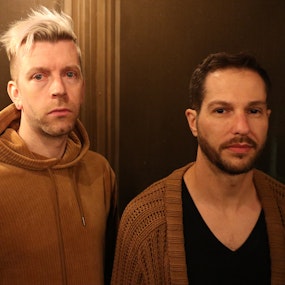
Bellwether
Formed in 2021 in Atlanta, Georgia, Bellwether consists of vocalist and multi-instrumentalist Isaac Collins, and drummer/producer Nathan Sheasby. Friends since the 4th grade, they have been playing music together in some form since the 9th grade. In their handful of live shows, they have shared the stage with Tigercub, The Mysterines and Ottoman Turks to name a few. Using music as therapy in the thick of quarantine, Bellwether tackles their way through topics like depression and the loss of a child to shame and restoration. Their goal from the beginning has been to create honest music that is 100% genuine. "We love that you're here and hope you're with us until the end."
Featured Episodes
Here are some great episodes to get started with



















